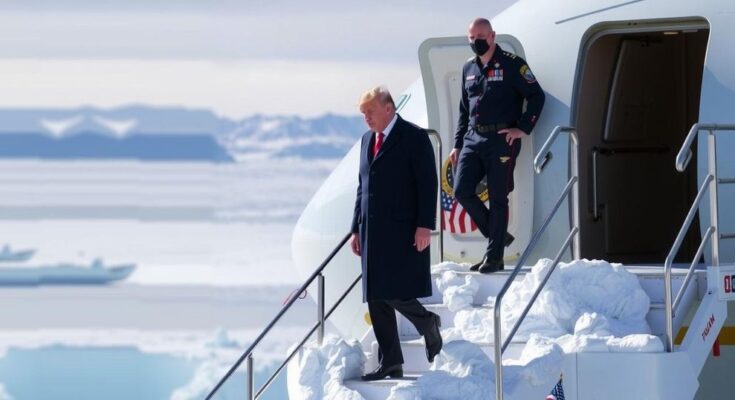Donald Trump Jr. plans to visit Greenland following his father’s recent comments on U.S. ownership of the island. Greenland’s leadership has firmly rejected this notion, emphasizing their autonomy and national identity. The visit, while positioned as private media coverage, raises significant geopolitical implications and interactions with both Danish and Greenlandic authorities.
Donald Trump Jr. is poised to visit Greenland shortly after his father, former President Donald Trump, reiterated his interest in U.S. ownership of the island, which operates as an autonomous territory of Denmark. The purpose of Mr. Trump Jr.’s one-day visit is to capture video content for a podcast, as reported by U.S. media outlets. Former President Trump previously stated that acquiring Greenland was imperative for national security, an assertion that reignited debate and drew strong rebuke from Greenland’s leadership, asserting their sovereignty. Prime Minister Mute Egede firmly stated, “We are not for sale and we will not be for sale; Greenland belongs to the people of Greenland.”
Located strategically on the route connecting North America to Europe, Greenland is of significant interest to the United States, especially as it houses a major U.S. space facility. During the 2024 election campaign, Donald Trump Jr. was an active figure, engaging frequently in rallies and media appearances. However, his upcoming trip is privately funded and not associated with any official governmental capacity, as clarified by the Danish foreign ministry, which indicated they would not comment further on the matter.
Coinciding with the statements from President-elect Trump, Danish officials announced a substantial increase in defense spending for Greenland, described by Defense Minister Troels Lund Poulsen as an ironic twist of fate. Additionally, recent changes to Denmark’s royal coat of arms to better include representations of Greenland were interpreted by some as a gesture contrasting with Trump’s ambitions. King Frederik X emphasized Denmark’s unity with Greenland in a recent address, while Prime Minister Egede in his speech encouraged a push for independence from what he termed “the shackles of colonialism.”
This is not the first instance of a U.S. President expressing interest in acquiring Greenland; the concept originated under President Andrew Johnson during the 1860s. In a related geopolitical context, there have also been threats from former President Trump regarding reasserting control over the Panama Canal, to which Panama’s President asserted the canal is sovereign territory.
The interest in Greenland has historical precedent, stemming from U.S. presidents dating back to Andrew Johnson in the 1860s, reflecting the island’s strategic importance in Arctic geopolitics. Former President Donald Trump’s expression of desire for U.S. ownership has not only drawn international attention but has also intensified discussions about national sovereignty and colonial legacies. Greenland’s leadership has consistently rejected the idea of selling the territory, reinforcing their self-determination.
In summary, the visit of Donald Trump Jr. to Greenland occurs against a backdrop of revived interest in U.S. ownership of the territory, amid assertions of independence from local leadership. The response from Denmark’s government highlights the unofficial nature of the visit, while also indicating ongoing complexities regarding Greenland’s status within the Kingdom of Denmark. The implications of such a visit and the discussions it incites about sovereignty could have far-reaching effects on both local and international fronts.
Original Source: www.bbc.com




